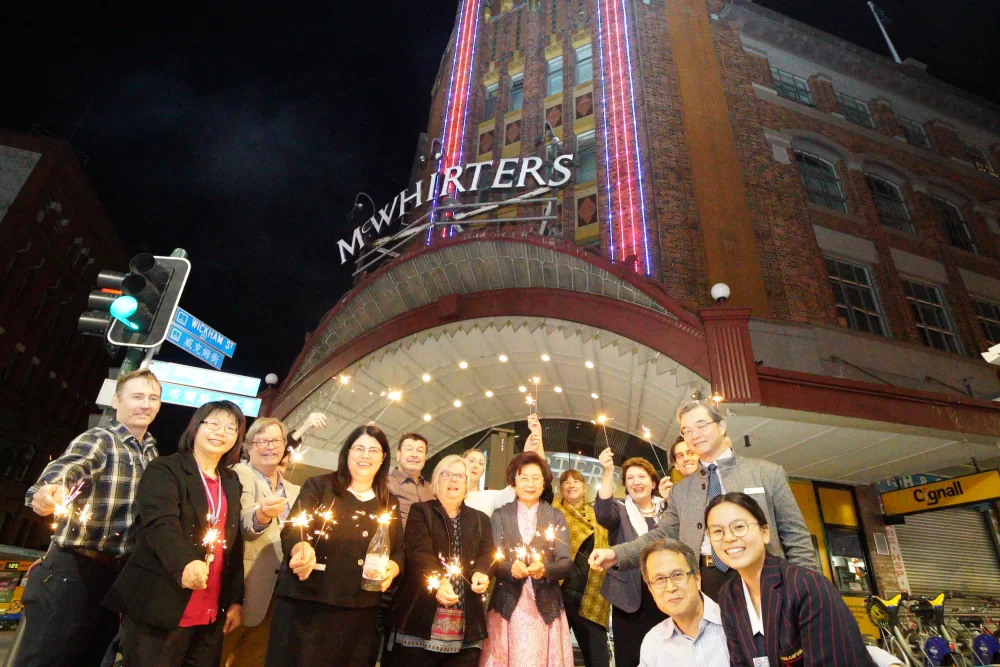“New ideas must use old buildings” – Jane Jacobs
Not dissimilar to the colourful and imposing history of the McWhirters family and their legacy of the magnificent building on the Valley corner, today’s management rights undertaking of the McWhirters Apartments is a story of endeavour, initiative and achievement – only this time by new Australians, Jill and Luke Hung and their grown children.
The magnificent flagship five-storey building which has graced Brunswick and Wickham Streets since its opening in 1931 is the vestige of Scotsman James McWhirter, one of Brisbane’s leading retailers of the late 19th and early 20th century and a permanent monument to the industry of men who nurtured the business from its early stages.
Aeons of history include early shoppers tethering their horses to hitching rails out front, the addition of a garage in 1918 and Myers buying the building in 1955 and operating from there until 1988 when the Valley was in a state of decline.
Added to the Queensland Heritage Register in 1992, the McWhirter building still stands, its red brick facade presiding over Brunswick Street Mall in the Valley. Today however, the upper floors have been converted to apartments and the ground floor is a rabbit warren of eateries, groceries and retail outlets.

As the owners of an existing long-term management rights operation in Sunnybank, Jill and Luke admit to being beguiled by the historic building and its idyllic location; and in true retail fashion, what started out as ‘window shopping’ turned into a purchase and relocation into the city.
McWhirters offers 114 spacious apartments positioned securely above the retail precinct, 50 percent of which are in the letting pool, and all feature high ceilings, large picture windows and contemporary kitchens. And being centrally located, the property offers easy access to virtually everything… surrounded by restaurants, theatres, live music and entertainment, it is also within walking distance to the Brisbane River and all forms of public transport.
So, other than the lure of the grand building I ask Jill and Luke why they opted for a property so different from the first.
“A long-term or permanent property is relatively simple to manage,” says Jill. “There is minimal marketing required and the working hours are generally consistent. We wanted to learn about and experience a mixed-use property.”
As a strong proponent of management rights as a business, particularly for Chinese operators, Jill says that the industry provides a steep learning curve for migrants, exposing them to situations and life experiences that they one wouldn’t normally experience.
“In addition to the business and caretaking aspects of running a building, one is exposed to people from all cultures, religions, educations, backgrounds and even moral standing and one has to learn to adapt and accept everyone for who they are.
“It’s been an invaluable experience for my children,” adds Jill. “They have got to see how different people interact and that life is about change, values and ethics, about evolving as a person and moving forward despite the challenges.
“Luke and I are very community orientated, and have introduced a number of social gatherings at the Sunnybank property. McWhirters has understandably taken a little longer to assimilate. Residents tend to move on more quickly in the city, and they take longer to form relationships. I am however, encouraged that we had a number of residents and committee members attend the ‘neon lighting ceremony’ that we held recently and that we have growing support from key stakeholders.
Jill’s advice to those contemplating management rights as a business, particularly the Chinese, is to understand how much of the role involves dealing with, and managing people. In an industry where relationship building is critical, the ability to communicate effectively is very important.
She also encourages incoming managers to attend the specialised training that is made available by different organisations and to upskill about compliance regulations. “Empowerment comes from knowing and understanding the role from the outset,” says Jill, “and one can’t fall prey to bullying if you know your rights.
“In saying that however, managers need to appreciate the complexities of the job and the fact that they may be called on to do things that aren’t on the schedule of duties; they may need to work longer hours and go the extra mile. A successful manager needs to know that they are not just looking after a building – they have a duty of care for all residents and need to focus on building good relationships. If these things can be done within reason, then they should – owners respond in kind when they see that you are doing what is best for the building.
“Last but not least, new managers need to remember that if they need assistance, there are specialists in the industry for a reason,’ says Jill. “The shared information within the tight knit Chinese community may not always be accurate; what happens to one may not necessarily be applicable or relevant to others – every property comes with its own unique set of circumstances.
“Even though McWhirters is our second management rights operation, taking it on with a brief handover makes the initial transition and management of the property far more difficult than it has to be,” adds Jill. “I really believe that new managers need greater industry support for a couple of months at least; someone they can reach out to when necessary and I would like to see the relevant industry bodies looking into this.”


















